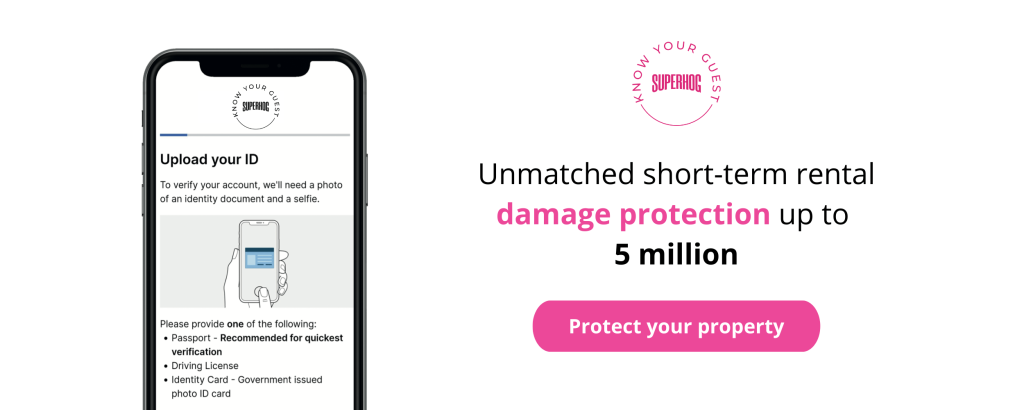Understanding short-term rental insurance for homeowners, landlords, property managers and hosts in the vacation rental industry.
The ultimate vacation rental insurance and damage protection guide is finally here!
Safely run your holiday lets with peace of mind that you have the correct policies in place for renters, regulations and accidental guest-related damages.
In this article, we’ll take you through everything you need to know about rental insurance and damage protection.
- Why do you need insurance for short-term rentals?
- The role of vacation rental insurance in the industry
- Vacation rental insurance for owners, hosts and property managers
- What protection is in place if I run a short-term rental?
- Why Aircover isn’t enough by itself
- How much does STR insurance cost?
- Protecting your vacation rental with risk management
- How to get started with Know Your Guest’s damage protection and risk management solutions
- Speak to us today!
Why do you need insurance for short-term rentals?
Let’s ask you this:
“What business would lend a stranger hundreds of thousands (or millions) of dollars worth of assets, no questions asked?”
They wouldn’t.
Yet, in the vacation rental industry, property managers and owners do this every single day. But, why?
As a short-term rental property manager, host or owner, you’re renting out your property to a high turnover of unknown guests on a regular basis. This increases your chances of potential damage, liability and even the probability of being sued, which is why as a host, insurance is a no-brainer.
It’s important to note that although it is not yet a legal requirement to obtain proper insurance when operating a home rental in the majority of countries and US states, it is highly advisable that insurance is put in place.
The tightening of home-sharing regulations will no doubt bring specific short-term rental insurance requirements, so it’s a good time to ensure you have the right coverage.
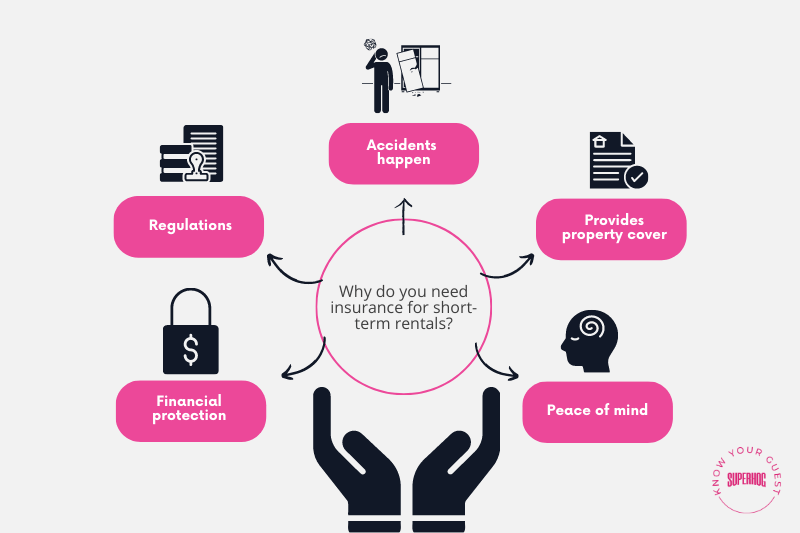
So, what exactly is short-term rental insurance?
Accidents happen. Damages occur. Business revenue can be lost.
Similar to other industries, whereby protection and premiums are put in place to cover damage and loss of assets – such as equipment rentals, and car hires – the short-term rental industry is no different.
As your rental property is a valuable asset and resource that holds economic value to you and your business, you need assurances in place from the get-go.
Short-term rental insurance is, therefore, a method of managing risks: protecting you from the unexpected.
It offers financial protection in the case of an incident when renting out to guests, specifically on a short-term basis.
How to classify ‘short-term basis’?
Most notably, short-term rentals are furnished, self-contained accommodations rented for a short period of time and seen as an alternative to hotels.
Typically, this is classified as less than six months; however, in the rapidly booming sharing economy, a property rented between one night to a few weeks is considered to be a short-term rental.
All the more reason you need home rental insurance.
The role of vacation rental insurance in the industry

It is a well-known sentiment for guests to believe holiday lets and vacation homes that are bookable online are held up to the same public liability standards as mainstream hotels; however, this just isn’t the case.
The role of vacation rental insurance is to:
- Provide financial stability and avenues for economic growth
- Reduce the impact of loss
- Provide certainty and peace of mind
- Damage control
The consequences of guest-related damages can be potentially disastrous. To prevent burning a hole in your pocket in unprecedented times, you will need a risk management plan to suit your business needs.
According to Leo Walton, Co-founder of Superhog: “It is undoubtedly in the interest of every party involved in the short-term rental sector to be appropriately insured”.
This goes for guests too! Safety is of utmost importance to them when booking holiday rentals; therefore, the certainty that vacation rental home insurance can provide you will also provide peace of mind to them.
So, how do you know you have the right coverage in place?
You need to:
- Look at your insurance documents, including existing homeowner’s insurance, buildings insurance and business policies
- Measure the risks associated with your rental property
- Value your asset
Ask yourself whether or not you will have the financial remuneration needed to resolve any incidents of damage and whether you have the assurances to continue hosting as a policyholder.
Vacation rental insurance for owners, hosts and property managers

Does homeowners insurance cover short-term rentals?
Don’t assume your insurance policy covers you and you do not need to do anything.
Traditionally, standard landlord and homeowners insurance does not cover short-term rentals and holiday lets, nor do they provide the proper levels of coverage you need to lease out your property on a short-term basis.
So, getting in touch with your provider and knowing where you stand is important.
Homeowner insurance
This is typically designed for the homeowner occupying the property.
Landlord policies
Are designed for a tenant occupying the property.
Vacation rentals
A vacation rental is unique in how it operates. It will typically see three uses:
- Guest stays: rented out to strangers on a short-term basis, including one-night stays to a few weeks
- Owner vacations: the owner of the property will vacation in the property at certain times in the year or offer the property to friends and family
- Unoccupied periods: the property will remain empty (unoccupied by guests or the owner) at certain times in the year
Not declaring the true operation of your property to your insurer is not an option. This can invalidate your policy.
You will be unable to make a claim when an accident arises due to a guest’s actions, and your insurer will likely revoke your insurance policy – affecting your business and ability to find a new insurance policy provider.
Are there homeowner policies that cover short-term rentals?
Increasingly, we are seeing more and more property insurers allowing owners to engage in the short-term rental-sharing economy without invalidating their policies. This is excellent news!
However, there are still significant coverage gaps within these policies, so it’s important to fully understand the T’s & C’s that come with this. The coverage may not be the right fit for you.
Remember, insurance is not one size fits all, so if you have multiple properties in different regions, states or even countries, it’s even more important to check where you’re covered.
We suggest you choose a specialist short-term rental insurance provider that will provide dedicated policies and comprehensive host insurance to your short-lease properties, especially when using booking platforms such as Airbnb, Vrbo and Booking.com.
Alternatively, short-term rental damage protection might be the solution you’re looking for to help bridge the coverage gap of your current insurance policy.
What is short-term rental damage protection?
Damage protection is a guarantee or feature that can be applied to your rental property as an added layer of protection against accidental guest damages that may occur during their booking.
Home insurance vs damage protection
Short-term rental damage protection can help bridge the coverage gap of standard home insurance, but it is important to note that it is not a substitute for homeowner or landlord’s insurance policies.
By ensuring your rental property has both insurance and damage protection, you are building an effective multi-faceted risk management strategy. The additional layers of protection will allow you to host with confidence and peace of mind that you are covered from all angles, protecting you from the unexpected.
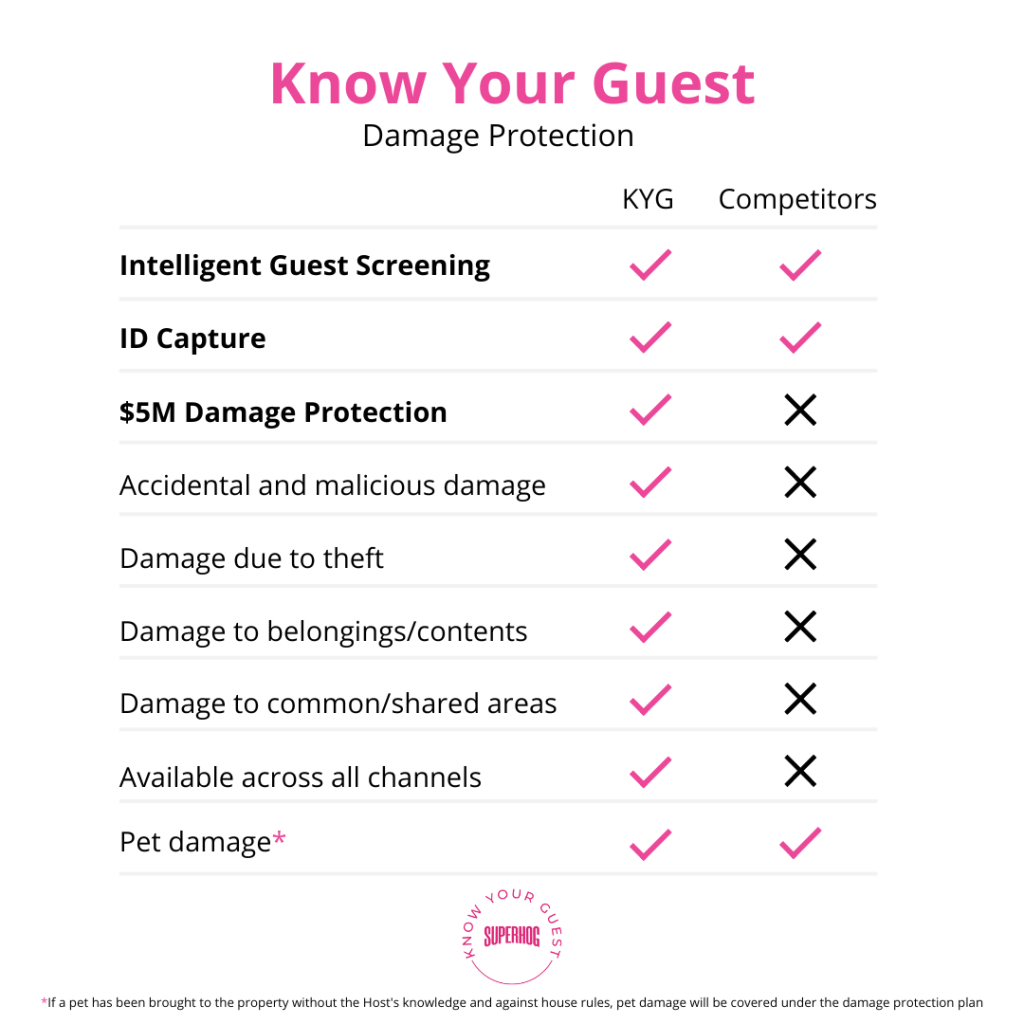
To Recap:
- Standard homeowner and landlord policies usually don’t cover vacation rental properties
- Vacation rentals typically have 3 uses: guest stays, owner vacations and unoccupied periods and you need to be covered for them all
- Choose a specialist short-term renal insurance provider or add a comprehensive damage protection solution to use alongside your current insurance policy
- Damage protection is not a substitute for insurance
- Build an effective risk management strategy with damage protection and short-term rental insurance
What protection is in place if I run a short-term rental?

The risks involved in vacation rentals are not new. Some of these include but are not limited to:
- Damage to your property
- Theft of property
- Guest liability
We know running a short-term rental can have its curve balls, so it’s always good to know what protection is in place.
Some of the options available to property managers, hosts and owners include:
- Superhog with Know Your Guest
- OTA platform protection
- Safely
- Proper
Superhog with Know Your Guest
What is Superhog?
Superhog is one of the leading technology providers for the short-term rental industry, focusing on building trust, mitigating risks and bridging the damage protection gap between standard insurance and the STR industry.
Primarily, Superhog focuses on the research and development of its technology-intensive services, so that all data is dynamically enriched through its proprietary AI engine, machine learning tools and cloud-based technology.
Superhog’s innovative technology has built out its risk management platform, Know Your Guest.
Know Your Guest is a product of Superhog, offering tech-based services and products to property managers, hosts and owners, including:
- Embedded insurance to short-term rental property managers, owners and hosts, in the form of damage protection up to $5 million across any booking channel
- Facilitating the collection of damage deposits
- Providing the opportunity for new revenue through the option of a damage waiver
OTA platform protection
Vrbo insurance for hosts
What is Vrbo?
Vrbo is a popular online marketplace for vacation rental hosts and holiday homeowners.
The HomeAway Group – including Vrbo – doesn’t offer its own insurance for short-term rentals but has a preferred partner for US vacation rentals, offering $1 million in liability coverage.
Airbnb insurance for hosts
What is Airbnb?
Airbnb is a short-term rental marketplace that acts as a broker between hosts and guests. It is one of the most popular booking platforms in the short-term rental space.
Airbnb offers AirCover for Hosts that is free for all hosts on the platform, offering up to $3 million in damage protection.
Why Aircover isn’t enough by itself
AirCover is a great step in the right direction when it comes to Airbnb hosts protecting their properties when renting out to Airbnb guests.
However, if you are looking for full damage protection that protects your properties across all booking channels, then AirCover is not the right fit for you. AirCover can only be used for bookings made on the platform and can not be used on alternative booking channels or OTA platforms.
Articles that may be of interest:
How much does STR insurance cost?
Like most insurances on the market, STR insurance costs will vary depending on multiple factors, including the coverage type you are after and even your property premises.
With that being said, there are some competitive prices out there. We can’t give you direct cost as each company is different. You just need to ensure you choose what’s best for you.
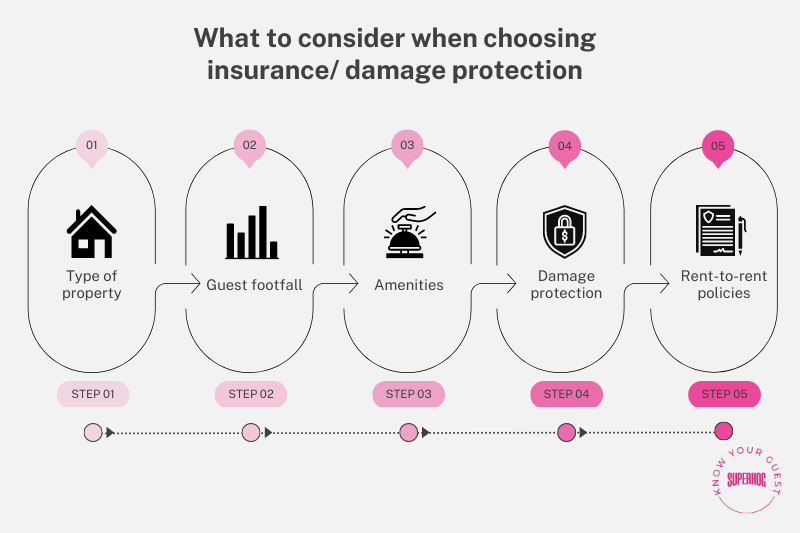
Top Tip: It’s best to go direct to the provider for quotes on your short-term rental insurance or damage protection, as cost calculations are personalised to each host, owner and business.
For a competitive quote on adding comprehensive damage protection to your short-term rental bookings, get in touch with Know Your Guest today.
Protecting your vacation rental with risk management
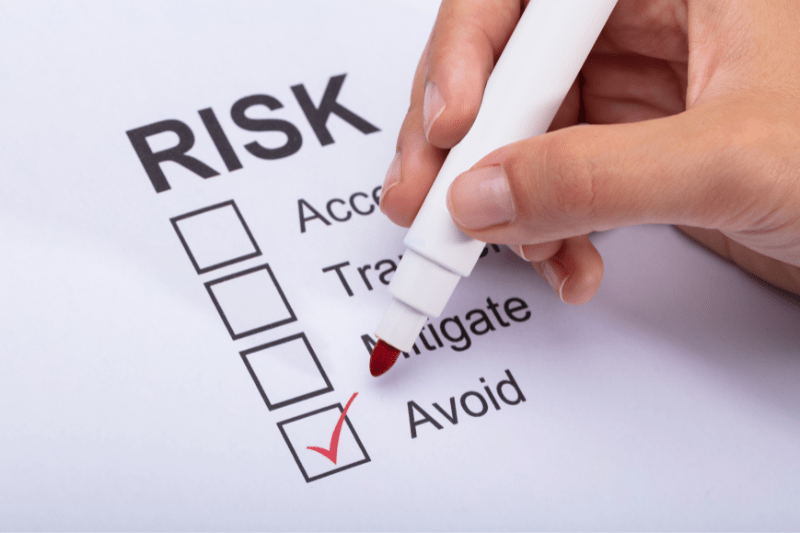
Prevention will always be a more effective solution in the long run than reaction.
Implementing a risk management solution to your short-term rental business will build you a greater defence against unruly guests, fraudulent bookings and property damages. Not only that, but you can scale your business more efficiently with the confidence that you’re always in control.
What are the benefits of risk management and damage protection?
It’s always good to check where the gaps in your protection are, so you can better understand the areas you need to mitigate risks.
But how do you mitigate these risks and bridge the gap?
You need a risk management strategy. This links back to: “What business would lend a stranger hundreds of thousands (or millions) of dollars worth of assets, no questions asked?”
Short-term rental insurance doesn’t prevent these risks and acts as a more reactive solution to a problem.
However, if you implement risk management solutions alongside your policy, you will be better prepared to prevent the risk from entering your property in the first place. These preventative solutions include:
- Intelligent guest screening
- ID capture
- Sex offender screening
- Deposit management
- Damage waivers
With these risk-mitigating strategies, you will be equipped to:
- Know exactly who your guest is
- Keep your neighbours happy
- Prevent parties
- Prevent fraudulent bookings
- Follow the latest regulations and law
- Have the means to cover smaller guest damages without the need to contact guests for reimbursements
Know Your Guest’s vacation rental damage protection for owners and property managers
As we have mentioned, damage protection is an additional layer of protection for you and your business. Damage protection will complement your homeowner’s insurance and landlord policies and even fill the void of coverage gaps.
Know Your Guest is here to protect owners, property managers and hosts, so you can minimise the risks associated with owning vacation rentals and hosting guests.

Important: Know Your Guest’s damage protection is for owners whose home insurance/policy does not cover damages caused by short-term rental guests. We recommend you speak to your insurer to see what your policy includes as not all property owners’ home insurance covers damages caused by short-term rental guests.
How to get started with Know Your Guest’s damage protection and risk management solutions
Know Your Guest is a globally accessible risk management platform for hosts, property managers and owners across all booking channels.
We mitigate risks through:
- Vacation rental guest screening
- Deposit management solutions
- $5,000,000 damage protection
Get in touch with us today to see how we can help your business prevent parties, fraud, and guest-related damages.


